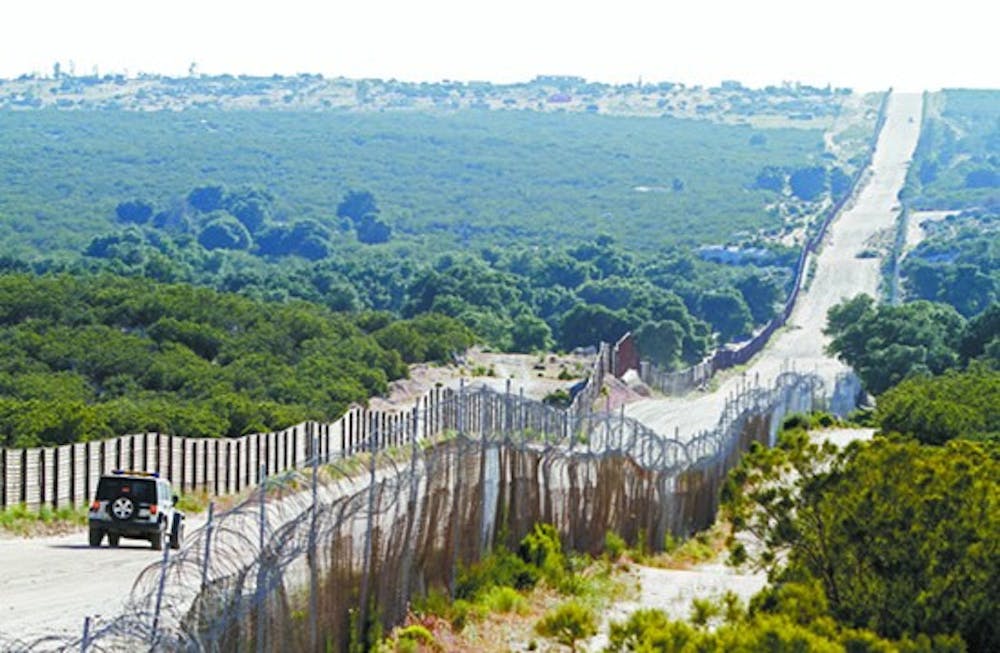The Arizona-Mexico border has been under scrutiny lately with the state’s new immigration law and President Barack Obama’s decision to provide additional troops and funding for border protection.
Border Patrol agents play a major role in protecting the nation’s boundary, but they are often overlooked as individuals.
The recent killing of a 15-year-old Mexican boy by a Border Patrol agent in El Paso, Texas, has even incited rage among Mexican citizens and authorities, putting a spotlight on the everyday decisions agents make.
Kendra Rivera, a communications Ph.D candidate, is working on a dissertation that focuses on how Border Patrol agents in California, Arizona, New Mexico and west Texas view their “work identities.”
“One of the things that I look at is basically how we form our identities, [or] how we form ideas about ourselves,” Rivera said, including how agents want to be viewed in a positive light by others.
Rivera wants to hone in on the unknown aspects of Border Patrol agents’ work, and she thinks that learning about agents can increase understanding of the border land.
“The broader public doesn’t know a lot about agents in terms of the emotional work that they have to do,” Rivera said. “We tend to think of stoic agents or law enforcement officers who are enforcing the laws.”
Rivera said Border Patrol agents have a bad reputation of being abusive to immigrants, but they shared a different story.
“What I found is that they do a lot of emotional work…including things like providing care to immigrants,” Rivera said.
She said agents give water, food and medical assistance to immigrants.
“One agent told me a story about a rape victim that they went out and bought clothes for because…her clothes had been destroyed,” Rivera said.
She said they use their experiences of providing care to “reframe their identities in positive ways.”
Past research shows law enforcement officers tend to distance themselves from people they work with, such as prisoners, she said, but agents are different.
“They identify closely with immigrants, largely because of this concept of the American Dream and immigrants coming to America to make a better life for themselves and their families,” Rivera said. “Agents could really identify with that narrative.
Rivera also found that agents feel isolated because they work in deserted regions.
“They can’t call for backup because sometimes their radios don’t work and sometimes there is no one else to call,” she said. “An ambulance can’t come out to some of these areas because they’re not reachable by ambulance, so it’s the Border Patrol who’s providing first-responder care.”
Like some believe, Rivera said agents have abused their power in certain situations.
“If we could better understand some of the stress and the challenges that agents face, we might be able to help agents become less abusive,” Rivera said.
However, agents she interviewed think the abuse is on an individual basis and not as a group overall.
“They felt that the organization as a whole would very much look down on abuse and punish severely…agents who were found to be abusive,” Rivera said, adding that better training might eliminate some abuse. “Agents need explicit training in the emotional aspects of their job.”
While some people think they’re being too harsh with immigrants, Rivera said agents believe they’re doing the best with what they have.
Putting up a virtual border or fence and improving training, as well as adding more agents, could help enforcement at the border, she said.
Sarah Tracy, a communications associate professor and Rivera’s adviser, said Border Patrol agents have an important contribution to society but are misunderstood.
“They really are diligent and endeavoring to enforce immigration laws that aren’t of their own making,” Tracy said. “Their work requires this delicate dance. They have to be tough, they have to be compassionate, they have to be diligent and steadfast in this job that is really solitary.”
She added that it’s physically and emotionally demanding.
“One of the things we know about the contradictions and dilemmas in work is when they’re not acknowledged or really talked about, they tend to drive people crazy,” Tracy said.
She said Rivera’s research could be used to help Border Patrol agents in relieving stress and improving their job experience and performance.
Matt Chandler, a spokesman for the Department of Homeland Security, said in an e-mail that more than 4,000 Border Patrol agents are located in Arizona currently.
He said that since Southwest border initiatives were launched last year by DHS Secretary Janet Napolitano to enhance border security, there has been an improvement in security with a growth in staff and technology, including an increase in the amount of drugs seized.
“By replacing old policies that merely looked tough with new policies that are smart and effective, we have demonstrated that the government is serious and strategic in its approach to enforcing immigration law in the interior of our country,” Chandler said.
Reach the reporter at reweaver@asu.edu




